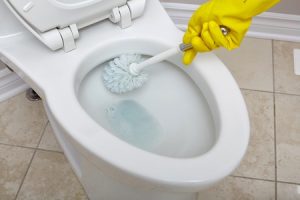
Septic systems play a crucial role in managing household wastewater efficiently and safely. However, not all household items are suitable for disposal in the septic system. Improper disposal of certain materials can lead to clogs, system malfunctions, and even environmental contamination.
Proper Flushing Down the Toilet
- Toilet paper is designed to break down easily in the septic system and is safe to flush.
- Biodegradable waste, like human waste, can be flushed down the toilet as the septic system is designed to treat and decompose it.
Avoid
- Avoid flushing non-biodegradable items such as sanitary products, baby wipes, facial tissues, or paper towels down the toilet. These items do not break down easily and can cause clogs in your plumbing and septic tank.
Kitchen Sink Drain
- Dispose of small amounts of food scraps in the kitchen sink. However, use a strainer or catch basket to prevent larger particles from going down the drain.
Avoid
- Avoid pouring cooking oils, grease, or fat down the kitchen sink. These substances can solidify in the pipes and lead to clogs in both your plumbing and septic system.
Cleaning Products
- Use septic-safe cleaning products. Look for products labeled as “septic-safe” or “biodegradable.” These products won’t harm the beneficial bacteria in your septic tank, allowing it to function optimally.
Avoid
- Avoid using harsh chemicals and antibacterial cleaners, as they can disrupt the balance of bacteria in your septic tank, hindering its ability to break down waste effectively.
Medications
- If you have expired or unused medications, do not dispose of them by flushing them down the toilet or pouring them down the sink. Instead, follow proper medication disposal guidelines provided by your local pharmacy or community.
Paints and Solvents
- Dispose of paints, solvents, and other hazardous chemicals at designated collection centers in your community. These items can be harmful to the environment and should never be poured down the drain or flushed.
Grease Traps
Do’s:
- If your home has a grease trap, make sure to have it cleaned and maintained regularly. Grease traps help prevent grease and oil from entering the septic system, reducing the risk of clogs and system issues.
Properly disposing of household items in your septic system is essential for maintaining its functionality and longevity. By following the do’s and don’ts mentioned above, you can ensure that your septic system operates efficiently and safely. Always remember that a well-maintained septic system not only benefits you but also contributes to a healthier environment. If you have any doubts about disposing of specific items, consult your local septic service provider for guidance on safe disposal practices. Together, we can protect our septic systems and preserve the well-being of our communities.
Contact Freedom Septic Service at (410) 795-2947 today or visit us online for more information about septic system services we offer.

Leave a Reply
You must be logged in to post a comment.